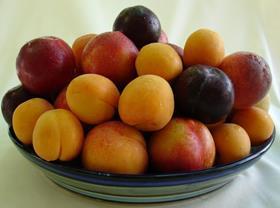
Despite the fact that South African (SA) growers and exporters have had a bumper 2008, they have started the 2009 season with concern about just how much the global 'credit crunch' will affect the buying power of consumers.
Additionally, traditionally early stonefruit is late this year, affecting early market supply.
'Lower temperatures in October and early November negatively affected stonefruit ripening as well as peach and nectarine sizing in the Western Cape,' said Capespan's technical advisor Michiel Bester. 'Consequently, the season start is even later than expected.
'Peach crop quality looks good and small Early Grand volumes were first packed during week 45,' he added. 'Apricots also seem promising, with the first Supergold to be harvested this week. Plum crop prospects are improving week by week.'
Stefan Conradie, product manager at the Stone Fruit Growers Association, said it is too early for final predictions about this year's volumes – but in general the prospects look good.
Charl Stander, stonefruit expert at Colorsfruit, agreed and said that the mild-to-cold spring in the Cape has still resulted in an excellent crop. 'We expect the nectarine and plum crops to increase, mainly due to the fact that a number of new orchards are coming into production. Only apricots will be down on last year due to some frost and hail damage in isolated areas.”
If crops turn out as predicted, South Africa could export around 13.2m cartons of stone fruit this year, 1m more than the previous season. Both nectarine and plum volumes are expected to be 10 per cent up on last year, with the peach export crop at a similar level to 2008. Apricot volumes are expected to fall 5 per cent on the previous season, when 836,000 cartons were exported.
Niel Hugo, Capespan regional manager for stone fruit and grapes, has joined other industry leaders in predicting a tough season. 'Production and packaging costs have increased by up to 35 per cent since last season,' he said.
Mr Hugo noted that during the past few weeks, European and UK retailers have not been eager to commit to programmes, with some buyers lowering initial demand estimates at quite a late stage due to slower sales of more expensive Southern Hemisphere fruit.
'The strengthening of the UK discount sector is also a big concern,' he said, adding that retailers are driving prices down to try and keep customers and are offering value lines to compete with discounters.
'The unknown factor is how the economic crisis will impact on the buying power of the consumers in our traditional markets,' said Graham Retief, chairman of the grape industry body SATI. 'With the US dollar also strengthening against the European currencies, diversification to the East becomes even more important, because it seems as if the consumers and economies there have been less affected by the credit crunch.'
Capespan's Neil Oosthuizen echoed the concern about trading conditions during the 2009 season: 'We already saw some effect in Europe towards the end of the citrus season and some retailers are hesitant to commit to the same volumes as last year, as well as to longer term supply programmes. In Japan consumers have a tradition of spending their money carefully and this trend will become even more evident this year as the credit crunch bites.'



